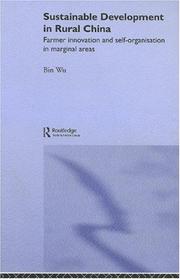| Listing 1 - 8 of 8 |
Sort by
|
Book
ISBN: 1429479868 9781429479868 Year: 2007 Publisher: [Place of publication not identified] United Nations Publications
Abstract | Keywords | Export | Availability | Bookmark
 Loading...
Loading...Choose an application
- Reference Manager
- EndNote
- RefWorks (Direct export to RefWorks)
Information technology --- Rural development projects --- Development projects, Rural --- Projects, Rural development --- Economic development projects --- IT (Information technology) --- Technology --- Telematics --- Information superhighway --- Knowledge management --- E-books
Book
ISBN: 9972623572 2821815433 2821826575 Year: 2008 Publisher: Institut français d’études andines
Abstract | Keywords | Export | Availability | Bookmark
 Loading...
Loading...Choose an application
- Reference Manager
- EndNote
- RefWorks (Direct export to RefWorks)
En el libro, la autora se pregunta de dónde provienen estas visiones del desarrollo, cómo son puestas en práctica en las comunidades del altiplano y cuál es su aporte al ejercicio de la ciudadanía, comparándolas con el debate actual en las ciencias sociales. Muestra el proceso que siguieron tres proyectos de desarrollo agropecuario PAMPA I, II y CECI Alpaca. Resume sus estrategias de intervención, así como los límites y las posibilidades que ofrecían los contextos locales para su despliegue. Plantea las diferencias entre las ideas, los mecanismos y resultados de la práctica del desarrollo entre los diferentes actores, resaltando los contrastes de su aplicacíon después de la Reforma Agraria entre 1980 y 1990. En este período, Bolivia tuvo como marco de los proyectos de desarrollo la Ley de Participación Popular y Ecuador, las demandas étnicas de la organizaciones indígenas apoyadas por la cooperación internacional. En el Perú el impacto de la violencia política interna negó la presencia del Estado y dificultó la intervención de los proyectos en las zonas rurales del país. La autora reflexiona junto con los propios actores sobre sus imaginarios y percepciones del desarrollo y propone un diálogo entre las diferentes visiones.
Rural development projects --- Rural development --- Sociology & Social History --- Social Sciences --- Social Conditions --- Development projects, Rural --- Projects, Rural development --- Economic development projects --- agriculture --- développement agricole --- élevage --- projet de développement --- communauté rurale --- Pérou --- altiplano --- situation politique --- violence
Book
ISBN: 8122421490 9786612074370 1282074377 8122427081 9788122427080 9781282074378 9788122421491 9788122421491 9788122427080 Year: 2008 Publisher: New Delhi : New Age International (P) Ltd., Publishers,
Abstract | Keywords | Export | Availability | Bookmark
 Loading...
Loading...Choose an application
- Reference Manager
- EndNote
- RefWorks (Direct export to RefWorks)
About the Book: Managing rural projects is a challenging task, which requires patience, skill, knowledge, social belongingness with rural community and managerial attribute to deliver good results. We have seen many rural development programmes either converted, merged or even having been finished half-heartedly. Need for literature on management of rural projects has been felt by students, practitioners and professionals working in rural projects. This book will help in fulfilling the knowledge-based requirements in project planning, implementation, monitoring, evaluation and many other exer
Project management -- Handbooks, manuals, etc. --- Project management. --- Rural development projects -- Handbooks, manuals, etc. --- Rural development projects. --- Sociology & Social History --- Social Sciences --- Social Conditions --- Rural development projects --- Project management --- Development projects, Rural --- Projects, Rural development --- Economic development projects
Book
ISBN: 1565494431 9781565494435 9781565494428 1565494423 9781565494411 1565494415 9781565494442 156549444X Year: 2012 Publisher: Sterling, Va. : Kumarian Press,
Abstract | Keywords | Export | Availability | Bookmark
 Loading...
Loading...Choose an application
- Reference Manager
- EndNote
- RefWorks (Direct export to RefWorks)
Information and Communication Technologies (ICTs) are widely heralded as an opportunity for the poor to have greater access to information that can help them escape poverty. ICTs also provide local NGOs that work with the poor access to knowledge that can guide them in implementing better development programs. Such ideas reflect long-held notions about the role of knowledge provision as a tool for development.But as author Tanya Jakimow shows, the consequences of the "information age" are often unintended and deviate greatly from our image of an interconnected, modern world. Not only do most people remain largely excluded from ICTs, but when they do engage with these technologies, they do so in unforeseen ways. Peddlers of Information shows how local NGOs in rural India are actually using these technologies-particularly the internet-and the implications this has had for development work and ideas about poverty. Jakimow's critique of dominant views on ICTs and her discussion of class and power relations in Southern organizations is essential reading for development scholars and practitioners.
Economic development projects --- Rural development projects --- Information technology --- Poor --- Non-governmental organizations --- Development projects, Rural --- Projects, Rural development --- Development projects, Economic --- Projects, Economic development --- Economic assistance --- Technical assistance --- E-books

ISBN: 3211380299 3211254633 Year: 2005 Publisher: Springer Vienna
Abstract | Keywords | Export | Availability | Bookmark
 Loading...
Loading...Choose an application
- Reference Manager
- EndNote
- RefWorks (Direct export to RefWorks)
Bamboo construction --- Roofs, Shell --- Rural development projects --- Architecture --- Study and teaching (Higher) --- Architecture, Primitive --- Architecture, Western (Western countries) --- Building design --- Buildings --- Construction --- Western architecture (Western countries) --- Art --- Building --- Development projects, Rural --- Projects, Rural development --- Economic development projects --- Barrel-shell roofs --- Butterfly-shell roofs --- Cylindrical shell roofs --- Shell roofs --- Arches --- Domes --- Shells (Engineering) --- Building, Bamboo --- Construction, Bamboo --- Structures, Bamboo --- Design and construction
Book
ISBN: 1623200830 9781623200831 1623200822 9781623200824 1322964246 Year: 2013 Publisher: Honolulu, [Hawaii] : Enrich Professional Publishing, Inc.,
Abstract | Keywords | Export | Availability | Bookmark
 Loading...
Loading...Choose an application
- Reference Manager
- EndNote
- RefWorks (Direct export to RefWorks)
Rural development --- Rural development projects --- Community development --- Development projects, Rural --- Projects, Rural development --- Economic development projects --- Community development, Rural --- Development, Rural --- Integrated rural development --- Regional development --- Rehabilitation, Rural --- Rural community development --- Rural economic development --- Agriculture and state --- Economic development --- Regional planning --- Citizen participation --- Social aspects --- E-books

ISBN: 1280073179 0203638050 0203633652 0415297192 1134432577 9780203633656 9780415297196 9786610073177 6610073171 9781134432523 9781134432561 9781134432578 Year: 2003 Publisher: London ; New York : RoutledgeCurzon,
Abstract | Keywords | Export | Availability | Bookmark
 Loading...
Loading...Choose an application
- Reference Manager
- EndNote
- RefWorks (Direct export to RefWorks)
Sustainable development in marginal areas, especially in those where rural poverty and environmental degradation are interwoven, is a great concern of development agencies worldwide, and much effort is put into development programmes, technology transfer schemes and so on. The problem is particularly acute in China, where increasing regional differences and inequality are eroding governmental poverty reduction efforts and exacerbating ecological crises. This book, based on extensive original research, examines the situation in China, especially in the Loess Plateau of Shaanxi Province. It expl
Agricultural innovations - China. --- Agriculturally marginal lands - China - Management. --- Rural development - China - Regional disparities. --- Rural development - Environmental aspects - China. --- Sustainable development - China. --- Sustainable development. --- Sustainable development --- Rural development projects --- Economic History --- Business & Economics --- China --- Economic conditions --- S20/0280 --- S20/0253 --- China: Agriculture forestry, fishery, natural disasters--Rural economic development --- China: Agriculture forestry, fishery, natural disasters--General works: since 1979 --- Development projects, Rural --- Projects, Rural development --- Economic development projects
Book
ISBN: 0674735838 9780674735835 9780674289949 0674289943 Year: 2015 Publisher: Cambridge, Massachusetts
Abstract | Keywords | Export | Availability | Bookmark
 Loading...
Loading...Choose an application
- Reference Manager
- EndNote
- RefWorks (Direct export to RefWorks)
Thinking Small tells the story of how the United States sought to rescue the world from poverty through small-scale, community-based approaches. And it also sounds a warning: such strategies, now again in vogue, have been tried before, with often disastrous consequences. It is common for historians to interpret the United States’ postwar development campaigns as ill-advised attempts to impose modernity upon poorer nations. The small-scale projects that are popular today mark a retreat from that top-down, heavy-handed approach. But Daniel Immerwahr shows that community-based development is nothing new: it has been present since the origins of international development practice, existing alongside—and sometimes at the heart of—grander schemes to modernize the global South. His transnational study follows a set of strange bedfellows—the Peace Corps and the CIA, Mohandas Gandhi and Ferdinand Marcos, antipoverty activists and Cold Warriors—united by their conviction that development should not be about engineers building dams but about communities shaping their own fates. The programs they designed covered hundreds of millions of people in some sixty countries, eventually making their way back to the United States itself during the War on Poverty. Yet the hope that small communities might lift themselves up was often disappointed, as self-help gave way to crushing forms of local oppression. Thinking Small challenges those who hope to eradicate poverty to think twice about the risks as well as the benefits of community development.
Community development --- Economic assistance, American --- Rural development projects --- Development projects, Rural --- Projects, Rural development --- Economic development projects --- American economic assistance --- Mutual security program, 1951 --- -Community development --- Regional development --- Economic assistance, Domestic --- Social planning --- History. --- Citizen participation --- Government policy --- History --- E-books --- Community development - United States - History --- Community development - Developing countries - History --- Economic assistance, American - Developing countries - History --- Rural development projects - United States - History --- Rural development projects - Developing countries - History
| Listing 1 - 8 of 8 |
Sort by
|

 Search
Search Feedback
Feedback About
About Help
Help News
News